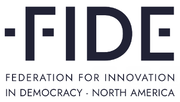 Explore the UN Peacebuilding Architecture Review, from the Global Partnership for the Prevention of Armed Conflict, transitioning from local construction sites to the global policy-making corridors of the United Nations. This review process, aimed at preventing conflict and fostering recovery, is managed by the Peacebuilding Commission, Fund, and Support Office, working together like a coordinated construction team. It offers local peacebuilders the opportunity to influence global policies, ensuring they address community needs and promote sustainable peace. Active participation enables local actors to drive meaningful changes, gain valuable skills, and access important opportunities. Read the blog post below and learn more here.
0 Comments
 The Knowledge Network on Climate Assemblies (KNOCA) is hosting a webinar "Climate Assemblies: Emerging Trends, Challenges and Opportunities", on May 2nd from 8:30 - 10:00am Eastern, 5:30 - 7:00am Pacific. While KNOCA is based in Europe, we know there is much to learn from climate assemblies and takeaways on how to further bring citizens' voices into climate governance. Graham Smith will present insights from an upcoming report on climate assemblies. Erica Hope and Claudia Chwalisz will lead discussions on integrating citizen voices into climate governance. KNOCA aims to enhance climate assembly impact by fostering dialogue among stakeholders and shaping future trends in assembly practice to strengthen climate policy and governance. Learn more in the post below and on KNOCA's site here. Federation for Innovation in Democracy North America Launches, Plus Citizens' Assembly School4/5/2024  We invite you to check out the newly launched Federation for Innovation in Democracy North America (FIDE NA), which aims to advocate for Citizens' Assemblies and provide technical guidance. They're hosting a Capacity Building School from April 18-20 in DC featuring international experts, and the Global Innovations in Democracy event from April 15-17. Thank you to Marjan H. Ehsassi, FIDE NA Executive Director, for sharing this announcement with the NCDD network! Learn more in the post below and on the FIDE NA site here. |
Categories
All
|
Follow Us
ABOUT NCDD
NCDD is a community and coalition of individuals and organizations who bring people together to discuss, decide and collaborate on today's toughest issues.
© The National Coalition For Dialogue And Deliberation, Inc. All rights reserved.
© The National Coalition For Dialogue And Deliberation, Inc. All rights reserved.

 RSS Feed
RSS Feed